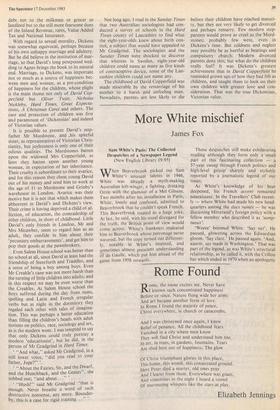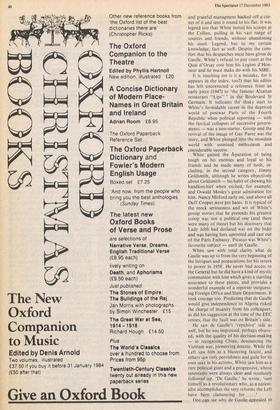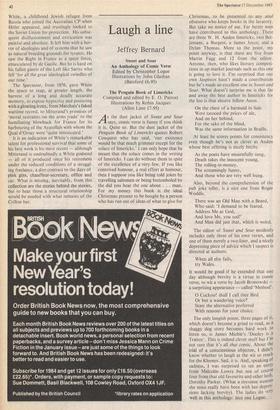More White mischief
James Fox
Sam While's Paris: The Collected Despatches of a Newspaper Legend (New English Library £9.95)
When Beaverbrook picked out Sam White's unusual talents in 1946, White was already a myth-making Australian left-winger, a fighting, drinking Ozzie with the glamour of a Mel Gibson. Two months after his installation in Paris, While, lonely and confused, admitted to Beaverbrook that he couldn't speak French. This Beaverbrook treated as a huge joke. At last, he said, with his usual disregard for the truth, the British point of view would come across. White's frankness endeared him to Beaverbrook whose patronage never wavered, but the copy turned out different- ly, notably in White's inspired, and sometimes almost prescient understanding of de Gaulle, which put him ahead of the game from 1958 onwards.
Those despatches still make exhilarating reading although they form only a small part of this fascinating collection — a 37-year sweep through French politics and high-level gossip sharply and stylishly reported by a journalistic legend of our times.
As White's knowledge of his beat deepened, his French accent remained nonexistent. In the Travellers' Club recent- ly — where White had made his new head- quarters among the dues ruines — he was discussing Mitterand's foreign policy with a fellow member who described it as 'somp- tueuX'.
'Weeee' boomed White. `Say net'. He paused, glowering across the Edwardian gloom. `Say dare.' He paused again. 'And, aaarm, say made in Washington.' That was part of the legend, as was White's structural relationship, as he called it, with the Crillon bar which ended in 1970 when an apologetic and grateful managment hacked off a cor- ner of it and sent it round to his flat. It was legend too that White netted his scoops at the Crillon, pulling in his vast range of sources and friends, without abandoning his stool. Legend, but to my certain knowledge, fact as well. Despite the com- fort that his despatches must have given de Gaulle, White's refusal to pay court at the Quai d'Orsay cost him his Legion d'Hon- neur and he must make do with his MBE.
It is touching (or is it a mistake, for it appears in the index, too?) that his editor has left uncorrected a reference from an early piece (1947) to 'the famous Alsatian restaurant "Lips" ' in the Boulevard St Germain. It indicates the shaky start to White's formidable career in the deprived world of postwar Paris of the Fourth Republic when political reporting — with the farcical collapses of successive govern- ments — was a non-starter. Gossip and the revival of the image of Gay Paree was the story, and White plunged into the monclain world with unmixed enthusiasm and considerable success.
White gained the reputation of being tough on his enemies and loyal to his friends and he made many of both, in- cluding, in the second category, Jimmy Goldsmith, although he writes objectively about Goldsmith — his habit of chewing his handkerchief when excited, for example, and Oswald Mosley's great admiration for him. Nancy Mitford early on, and above all Duff Cooper,were pet hates. It is typical of the mock seriousness and wit of White's gossip stories that he pretends his greatest scoop was not a political one (and there were many of those) but his discovery that Lady Jebb had declared war on the bidet and was having hers uprooted and cast out of the Paris Embassy. Picasso was White's favourite subject — until de Gaulle.
White saw with total clarity what de Gaulle was up to from the very beginning of the intrigues and preparations for his return to power in 1958. He never had access to the General but he did have a kind of mystic communion with him which gives a startling assurance to these pieces, and provides a wonderful example of a reporter outguess- ing Foreign Office and State Department. It took courage too. Predicting that de Gaulle would give independence to Algeria risked the charge of insanity from his colleagues, as did his suggestion at the time of the EEC vetoes, that the fault was on Britain's side.
He saw de Gaulle's 'repulsive' side as well, but he was impressed, perhaps obsess- ed, with the quality of his decision-making — in recognising China, denouncing the Vietnam war, pioneering detente. While the Left saw him as a blustering fascist, and others saw only peevishness and guile for its own sake in his actions, White saw him as a rare political giant and a progressive, whose intentions were always clear and resolutely followed up. 'De Gaulle,' he wrote, 'sees himself as a revolutionary who, as a nation- alist accomplishes the very reforms the Left have been clamouring for ... '
One can see why de Gaulle appealed to White, a childhood Jewish refugee from Russia who joined the Australian CP when Hitler appeared, and trustingly looked to the Soviet Union for protection. His subse- quent disillusionment and extrication was painful and absolute. It left him with a hor- ror of ideologies and of systems that he saw as natural breeding grounds for tyrants. He saw the Right in France as a spent force, emasculated by de Gaulle, But he is hard on his fallen giants of the Left like Sartre who fell 'for all the great ideological swindles of our t i me.' .
The Spectator, from 1976, gave White the space to reap, at greater length, the harvest of a long and deadly accurate memory, to expose hypocrisy and posturing with a gloating irony, from Marchais's faked wartime record, to Mitterand's promises of 'moral restraints on the arms trade' to the humiliating blowback for Fr‘ance for its harbouring of the Ayatollah with whom the Quai d'Orsay were 'quite intoxicated.'
It is an indication of White's remarkable talent for professional survival that some of his best work is his most recent — although Mitterand is undoubtedly a White godsend — all of it produced since his retirement under the reduced conditions of a struggl- ing freelance, a dire contrast to the days of pink gins, chauffeur-secretary, office and car. What is missing, inevitably, from this collection are the stories behind the stories, but to hear those a structural relationship would be needed with what remains of the Crillon bar.








































































 Previous page
Previous page